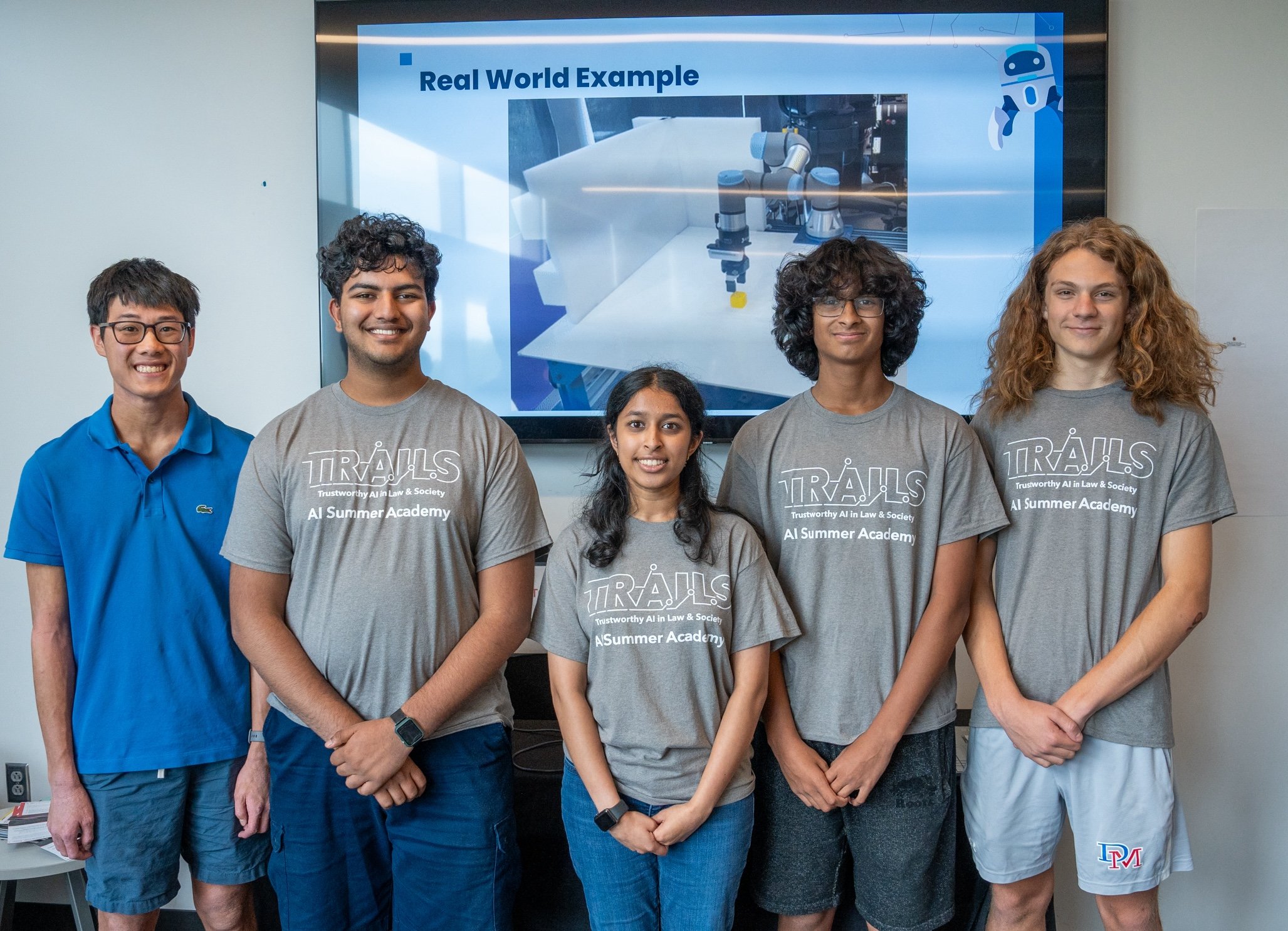TRAILS AI Summer Academy Empowers Future AI Innovators
Twenty-six high school students, most from Maryland, recently completed a two-week camp at the University of Maryland focused on developing skill sets needed to navigate the constantly expanding world of artificial intelligence (AI) and computer programming.

A joint effort between the Institute for Trustworthy AI in Law & Society (TRAILS) and the Iribe Initiative for Inclusion and Diversity in Computing (I4C), the TRAILS AI Summer Academy featured mentoring from UMD faculty, a field trip to an interactive museum focused on language, and group projects that covered hot topics like neural networks, machine learning and large language models (LLMs).
Kate Atchison, the associate director of I4C and a member of TRAILS, says the competitive program—more than 90 high school students from 12 states applied—offered participants both technical and ethical subject matter associated with the development, deployment and use of AI technologies.
“Students gained an excitement for AI, as well as an understanding of the impact that AI technology has on our society,” Atchison says. “In addition to seeing how AI is created, they explored biases in the technology, what can be done to mitigate those biases—all the while learning about coding concepts and computing research in a supportive and inclusive campus environment.”
The program, which ran from July 8–July 22, started with 25 hours of online learning to cover AI fundamentals. Once the students arrived on campus, they jumped into intensive, hands-on learning sessions with guidance from TRAILS faculty and other experts.
Renee Sharma, a rising sophomore at Havre de Grace High School in Harford County, says she discovered the AI academy during her search for camps at surrounding universities. She wanted to experience life on a college campus and the program aligned perfectly with her interest in AI.
“I've been hearing a lot about generative AI, and as someone who is really into coding, seeing how AI can write entire code snippets fascinated me,” Sharma says. “It made me realize that just knowing how to code isn’t enough—I should understand how AI can impact the future so that my work in computer science remains relevant. I don’t want to be just someone who codes; I want to do something significant and make a difference.”
Working on a project called “Modeling Interactions in Crowded Environments,” Sharma says she gained insight into various algorithms and libraries used in AI, such as neural networks and convolutional neural networks. The project, led by faculty and graduate students in the A. James Clark School of Engineering, focused on teaching robots to predict human movement in crowds without needing explicit directions.
Sharma’s group project was one of five offered at the summer academy that challenged participants to apply AI to real-world problems.
Saanvi Kakarlapudi, a rising sophomore at Mt. Hebron High School in Howard County, says that “the TRAILS camp really caught my eye because AI is such a growing field right now and something I’ve been interested in.”
Kakarlapudi (pictured right) worked on a project called “Peeking Outside the Opaque Box for Explainability: From Neural Networks to LLMs,” which focused on uncovering the inner workings of machine learning models to understand the key features influencing their decisions and build trust in their applications.
That project was led by Sanghamitra Dutta, an assistant professor of electrical and computer engineering, who says that the summer academy provided the perfect opportunity for participants to get a peek into the opaque operations of machine learning models through hands-on experience with data.
“Experiential learning enables them to better understand machine learning and explainability, as well as stimulates interest in pursuing STEM to spearhead the next generation of socially responsible technology,” Dutta says.
The AI academy students also took a field trip to Planet Word(link is external) in Washington, D.C., an immersive museum dedicated to language arts and the power of words, and participated in an interactive presentation with TRAILS faculty Marine Carpuat and Katie Shilton.
A cornerstone of the AI summer academy is its commitment to diversity and inclusion, says Atchison. The program was designed to specifically target underrepresented communities to create a more inclusive AI field.
Hal Daumé III, a professor of computer science and director of TRAILS, says that in the long run, he envisions programs like the AI summer academy playing a significant role in diversifying the face of AI development.
“I'm hoping that students will see that building next generation AI systems requires both innovations in AI methods as well as understanding how those systems will be used and who will be using them,” says Daumé, who also holds an appointment in the University of Maryland Institute for Advanced Computer Studies (UMIACS).
—Story by Melissa Brachfeld, UMIACS communications group
